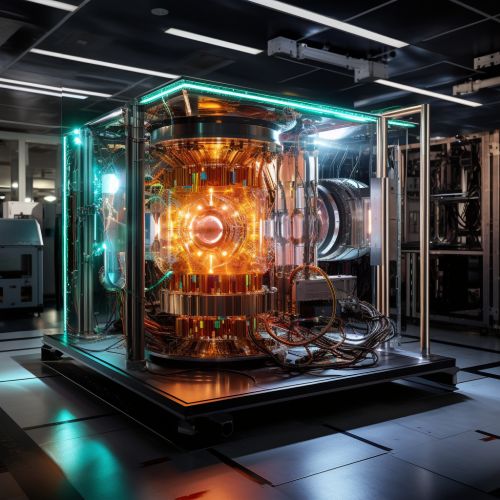Analog Quantum Simulation
Introduction
Analog quantum simulation (AQS) is a method used in quantum computing to mimic the behavior of complex quantum systems. The technique involves the use of a controllable quantum system, such as a quantum computer, to simulate another less accessible quantum system. This approach allows researchers to study quantum phenomena that are otherwise difficult to observe directly.


Background
The concept of analog quantum simulation originates from Richard Feynman's idea of a quantum simulator. Feynman proposed that a quantum simulator, a special type of quantum computer, could be used to simulate quantum systems that are too complex for classical computers. This idea has evolved into the field of analog quantum simulation, which has become a significant area of research in quantum computing.
Quantum Mechanics and Simulation
Quantum mechanics is a branch of physics that deals with phenomena on a very small scale, such as atoms and subatomic particles. It is characterized by principles such as superposition and entanglement, which are fundamentally different from the laws of classical physics. These principles make quantum systems highly complex and difficult to simulate accurately using classical computers.
Analog quantum simulation provides a solution to this problem by using a quantum system to simulate another quantum system. This is achieved by mapping the Hamiltonian, or the total energy operator, of the system being simulated onto the Hamiltonian of the simulator. This allows the simulator to evolve in time in a way that mimics the behavior of the system being simulated.
Types of Quantum Simulators
There are two main types of quantum simulators: analog and digital. Analog quantum simulators are designed to mimic a specific quantum system, while digital quantum simulators use quantum gates to perform general computations that can simulate a wide range of quantum systems.
Analog quantum simulators are typically more powerful and can simulate larger systems than digital simulators. However, they are less flexible and can only simulate systems that they are specifically designed to mimic.
Applications of Analog Quantum Simulation
Analog quantum simulation has a wide range of applications in various fields of science and technology. These include:
- Quantum chemistry: AQS can be used to simulate chemical reactions at the quantum level, providing insights into reaction mechanisms and helping to design new molecules and materials.
- Condensed matter physics: AQS can simulate quantum many-body systems, which are key to understanding phenomena such as superconductivity and quantum phase transitions.
- High energy physics: AQS can simulate quantum field theories, which are fundamental to our understanding of the universe at the smallest scales.
- Quantum information science: AQS can be used to explore new ways of processing and transmitting information using quantum phenomena.
Challenges and Future Directions
Despite its potential, analog quantum simulation faces several challenges. These include technical difficulties in controlling and measuring quantum systems, as well as theoretical challenges in accurately mapping one quantum system onto another.
However, ongoing research and technological advances are expected to overcome these challenges and further expand the capabilities of analog quantum simulation. This includes the development of more powerful and flexible quantum simulators, as well as new methods for controlling and measuring quantum systems.
